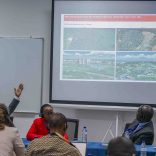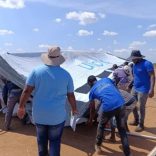Project to boost SADC disaster response capacity
To the Leaders of the Southern African Development Community Organ Troika

As representatives of civil society from across Africa and the world, we welcome the decision by the Double Troika taken on 8 April to deploy a technical team in Mozambique to inform coordinated action by the regional body.
The support of southern Africa, the continent, and the international community in stemming the violence in Cabo Delgado is long overdue. Our representatives see the shocking impact of this violence every day and in a crisis that has left 670,000 people without homes and killed more than 2,300 civilians, support to protect civilians is vital.
We therefore welcome collective action from SADC in committing to bringing sustainable peace to the region. We urge our leaders to consider the lessons learnt from other similar conflicts in Africa. Sahel, Somalia, and the Niger Delta offer stark contemporary reminders that a purely militaristic solution (devoid of measures to address the causes of the insurgency) increases the likelihood of its intractability. It is also unlikely to pave the way towards achieving sustainable peace.
We assert that intervention by SADC – whether military, humanitarian, development, or state-building – must be evaluated on its ability to protect all people affected by the conflict – particularly girls and women – without discrimination.
We therefore call for the region’s leaders to adopt a holistic response to Cabo Delgado. A people-centred approach should operationalize SADC’s commitment to Human Security, uphold International Human Rights and International Humanitarian Law (IHL).
We specifically call on SADC to consider:
1. Human Rights
- That a regional response should consider the African Commission on Human and Peoples’ Rights Principles and Guidelines on Human and Peoples’ Rights while Countering Terrorism in Africa.
- It should also address the disproportionate impact that the conflict has had on girls, women and other vulnerable groups. A gendered response that expresses and understands the unequal gendered dynamics of the conflict, the prevalence of Sex and Gender Based Violence (SGBV) in situations of conflict is also one that needs to align with the UN Resolution 1325 and SADC’s own Women, Peace and Security Strategy governed by its Gender Unit.
- How to facilitate and enable the freedom of movement of civilians in the conflict-affected region.
- The need for an accountability mechanism to ensure that the government of Mozambique adheres to its obligation to abide by international human rights law, international humanitarian law and ensuring the protection of civilians in the conflict, while providing and guaranteeing humanitarian access to aid workers.
2. Humanitarian
- Providing humanitarian actors with guarantees for safe and unhindered access to all conflict-affected areas to conduct necessary needs assessments and carry out a response based on assessed needs and vulnerability.
- Appointing a civil-military cooperation liaison to work with the humanitarian community, in the event that a decision is taken to deploy a military response. This liaison must work with the humanitarian community to ensure the safe access for all civilians to humanitarian assistance. It must also ensure the necessary distinction with humanitarian actors, thereby maintaining the clarity and congruence of humanitarian efforts.
- That any military deployment should recognise the need to uphold humanitarian principles to protect civilians and civilian infrastructure, within the IHL guiding principles of Humanity, Necessity, Proportionality and Distinction.
3. Peacebuilding
- Any SADC intervention should also provide avenues to pursue political and diplomatic solutions to the conflict. This necessitates an acute understanding of the root causes of the conflict, push and pull factors that lead to the recruitment of locals and youth into insurgency operations, and the motivations of actors operating in the region. Restoration of stability and security must lead to an opening of the space or deeper research and documentation of the conflict, to facilitate the development of effective policy measures that ameliorate the plight of vulnerable communities.
- Developing a roadmap for sustainable peace with avenues for local communities to address their grievances with government, which is paramount to addressing the root causes of conflict.
- Holding government and businesses to the highest levels of accountability regarding their operations in Cabo Delgado. Corruption, maladministration, and skewed development are central to communities’ feelings of marginalization. Ensuring that citizens receive the lion’s share of dividends from gas revenue form part of broader longer-term socio-economic solutions to insurgency.
4. Justice and Accountability
- Being guided by the Principles and Guidelines on Human and Peoples’ Rights while Countering Violent Extremism in Africa as well as other relevant AU instruments and policies.
- Instituting mechanisms that hold all perpetrators of violence to account – including government forces and private security companies who resort to extra-judicial tactics while conducting their duties.
- Establishing civil-military liaison points to allow citizens to safely report abuses; for these reports to be followed up and for perpetrators to be held accountable. This is especially so regarding reporting incidents of SGBV.
- Redress for victims – including reparations – and the prioritization of much-needed reforms at various levels of governance, as medium to long-term goals aimed at guaranteeing non-recurrence of violence.
The history of southern Africa teaches important lessons about overcoming tyranny and oppression. It is one that draws on the strength of the collective, the values of solidarity and putting the wellbeing of our people first.
We offer our support to the leaders of SADC in executing a human-centred, humane response to the crisis in Mozambique and remain open to work with governments of the region to implement these objectives in good faith.
Signed:
1. Center for Democracy and Development (CDD)
2. Jenerali Ulimwengu
3. Kuhluka Movement
4. Farmers and Herders Initiative for Peace and Development Africa
5. HAKI Africa
6. Atrocities Watch Africa
7. AfricanDefenders (Pan-African Human Rights Defenders Network)
8. Pan African Lawyers Union (PALU)
9. Southern Africa Human Rights Defenders Network (SAHRDN)
10. Africa Judges and Jurists Forum (AJJF)
11. African International Humanitarian Law Initiative (AIHLI)
12. Defenders Coalition – Kenya
13. Southern African People’s Solidarity Network (SAPSN)
14. Protection International Africa
15. Femnet
16. SAPES Trust
17. Afro-Middle East Center (AMEC)
18. Crisis in Zimbabwe Coalition
19. Zimbabwe Coalition on Debt and Development
20. Denis Hurley Peace Institute
21. Western Kenya LBQT Feminist Forum(Lets Be Tested Queens CBO)
22. Human Development Agenda-HUDA
23. International Service for Human Rights (ISHR)
24. Institute for Justice and Reconciliation (IJR)
25. Centre for the Study of Violence and Reconciliation (CSVR)
26. South African Institute of International Affairs (SAIIA)
27. CIVICUS
28. Amnesty International
29. Tearfund
30. Plan International












Leave a Reply
Be the First to Comment!
You must be logged in to post a comment.
You must be logged in to post a comment.